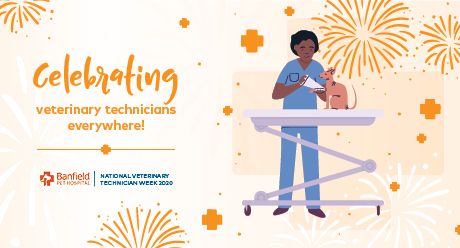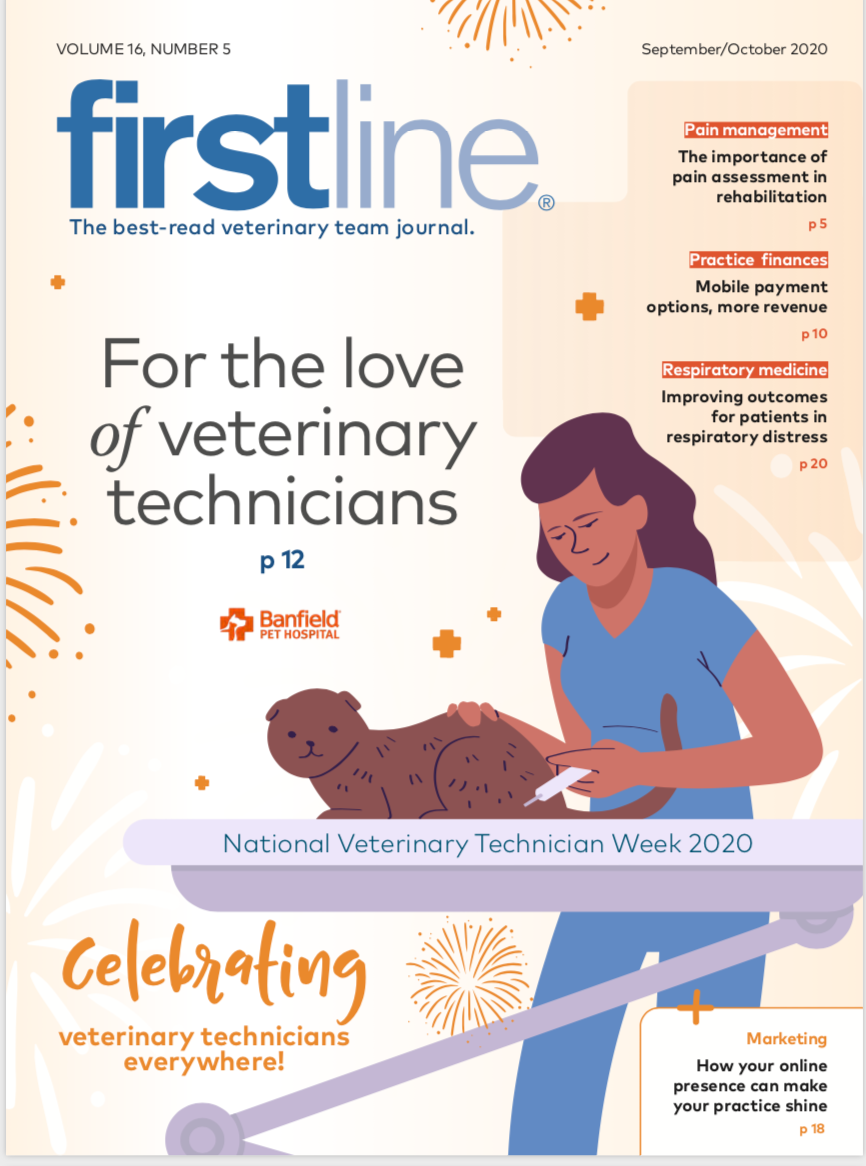For the love of veterinary technicians
During Tech Week and every week, we salute technicians everywhere for the hard work, dedication, and indomitable spirit that makes you an integral part of the veterinary team.

October 11 to 17 marks the 27th annual National Veterinary Technician Week, a time to honor you! We join in celebrating all that you do every day to care for animals of all shapes and sizes, and in both traditional and nontraditional ways. So, take time this week to celebrate your accomplishments large and small, and take the opportunity to educate pet parents everywhere about all you do to care for their animal companions. dvm360.com, navta.net, and avma.org offer loads of great ideas to help you and your practice make the most of this week. While we acknowledge and appreciate all technicians (and other team members), this year we asked veterinary technician specialists to share what they love about working in the veterinary field. Their comments follow.
Becoming a VTS: What it takes to make it
There are currently 16 recognized veterinary technician specialties: anesthesia and analgesia, behavior, clinical pathology, clinical practice, dentistry, dermatology, diagnostic imaging, emergency and critical care, equine nursing, internal medicine, laboratory animal medicine, nutrition, ophthalmology, physical rehabilitation, surgery, and zoology. Each specialty academy has specific requirements for credentialing, but all applicants must complete a formal process of education, training, experience, and testing to qualify. You must be able to show mastery in the core skills specified by the academy. Requirements for demonstrating mastery typically include 3 to 5 years of hands-on experience in your chosen discipline, a log of 30 to 70 cases related to the specialty field from the year preceding the application, detailed case reports on several of these cases, and letters of recommendation. Once your application is accepted, you must pass the specialty exam to become a VTS. To learn more about becoming a veterinary technician specialist, visit navta.net or the individual specialty academy websites.
Every day is different

“Caring for zoo animals comes with challenges, but it can also be extremely rewarding. The best thing about my job is that every day is different. Because zoo vet techs work with all species, most days require a lot of creativity and flexibility. I am continually inspired to learn new techniques and treatment methods for the benefit of my patients. I love having the opportunity to work with a variety of creatures, and the knowledge and professional growth that come with it.”
—Erica Campbell, AAS, LVT, VTS
(Zoo) Detroit Zoological Society
Royal Oak, MI
More than skin deep

“Being a veterinary technician means I get to help improve the lives of not only our patients but their owners as well. I love when clients come back and tell me how much happier, playful, and joyful their pets are since starting treatment. Our patients deserve the best quality of life we can give them. Skin disease is more than skin deep!”
—Juliann London, AAS, RVT, VTS (Dermatology)
Animal Dermatology & Allergy,
Rocklin, CA
Drawn to the “pop”

“Becoming specialized in veterinary dermatology was a lifelong dream for me. I have been focusing solely on dermatology for 17 years and have loved every minute of it. I have always been drawn to the “pop!” I love to watch an abscess being drained, and being able to express a cyst is always the highlight of my day. In academia, we see a variety of species with a variety of diseases. It is very satisfying to be a part of the team that can help a miserable patient become a happy lovable pet again.”
—Amanda Friedeck, BS, LVT, VTS (Dermatology)
Texas A&M University,
College Station, TX
Doing good

“Being a veterinary technician boils down to soul searching and being a steward of the Earth and all of the creatures that live here. My path started back in the 1980s and has led me to finding my niche as a VTS (Dermatology). This allows me to be an advocate for my patients and to improve their quality of life, which in turn improves their owners’ quality of life. Being a veterinary technician has allowed me to do good in this world, while touching the lives of many.”
—Jennie Tait, AHT, RVT, VTS (Dermatology - Charter)
Yu of Guelph Veterinary Dermatology
Guelph Veterinary Specialty Hospital Guelph,
Ontario, Canada
A new adventure every day

“Being a veterinary technician is exciting and rewarding. I started bringing stray animals home when I was a small child. I had every small animal possible. I took care of them all on my own. It taught me about responsibility and husbandry. And it is never boring. Every day is a new adventure. Working in academia is extremely fulfilling as we continue to help teach and guide the veterinarians of the future. I absolutely love my job and couldn’t imagine doing anything else. Being a veterinary technician specialist has given me the tools and confidence to excel in my career. I am extremely proud to be a veterinary technician.“
—Christopher Rizzo, LVT, VTS (EVN, LAIM)
University of Pennsylvania School of Veterinary Medicine
New Bolton Center, Kennett Square, PA
Paving the way

“I have been a veterinary technician for 42 years. To me, being a technician means that the research I am a part of every day will help not only humans but also animals. Working in primate research can be very rewarding in so many ways, from providing enrichment to anesthesia to study paradigms. I love being in the forefront of science ready to tackle the next unknown, and paving the way for future generations of veterinary technicians!”
—Victoria Elam, CVT, VTS (LAM) Kalin Lab,
University of Wisconsin Department of Psychiatry,
Madison, WI
Can’t ask for more

Being a veterinary technician in a zoological facility means having the good fortune to work with remarkably diverse species and constantly learning through daily experiences with the animals. In addition, it means being in the company of incredible keepers, curators, zoological managers, and veterinary staff at my facility and within the profession as a whole. As a member of the Association of Zoo Veterinary Technicians, I can say that my colleagues at other facilities are some of the best caretakers in the country. Basically, I am surrounded by amazing animals and people all the time, and I can’t ask for anything more.
—Joe Ullmer, BS, RVT, CVT
Kansas City Zoo,
Kansas City, MO
Stressful but rewarding

“I am a zoo veterinary technician, which means I get to provide care for some of the world’s most charismatic animals and help in the conservation process for these incredible species. This career path can be stressful, but it is extremely rewarding! My day can start in one direction and completely swing in another direction within a few hours, which provides the variability and challenges that I love.”
—Dewey Maddox, CVT
White Oak Conservation,
Yulee, FL
An honor and a privilege

“A veterinary technician’s job, at its core, is service. Not only do we support and assist our veterinarians, we actively work to improve the lives of the animals around us. For a zoo tech, this responsibility means not only developing and maintaining a skill set that can medically accommodate a wide range of species, but also advocating for all the creatures who share our world through conservation and field work. It is an honor and a privilege to be entrusted with these rare and vulnerable patients, and I enjoy rising to the challenge.”
—Lisa Bonanni, CVT, BS, VTS (Zoo)
Buttonwood Park Zoo,
New Bedford, MA
Collaboration and networking

“Being a veterinary technician means collaborating with other veterinary professionals to provide the best possible animal care. Networking to share knowledge and experience is essential in zoo medicine to keep current with evolving medical, husbandry, and voluntary training techniques. Excellent resources for me include organizations like the Association of Zoo Veterinary Technicians and the Academy of Veterinary Technicians in Anesthesia and Analgesia.”
—Angie Sutton, BS, CVT, VTS (Anesthesia and Analgesia)
Henry Vilas Zoo,
Madison, WI
A hell of a ride

As I wind down my career after 38 years, I am beaten up, arthritic, and have no retirement to fall back on, BUT I would not have changed a single thing about my life as a veterinary technician. I have loved, lived, and lost with my clients and their companions, and I have done it with a glad heart. If anyone asks if they should pursue a career as a vet tech, I wholeheartedly tell them to do it and hang on for a hell of a ride.
—Sara Sharp, AAS, CVT, VTS (Dentistry)
Bel-Rea Institute of Animal Health Technology,
Denver, CO
